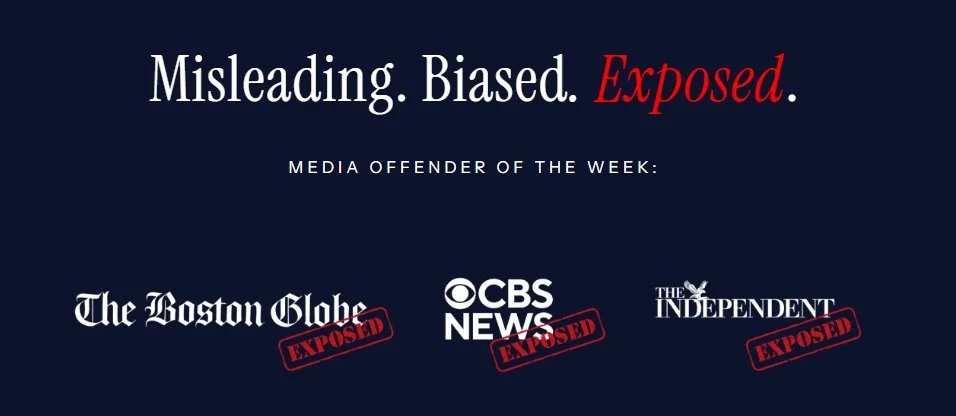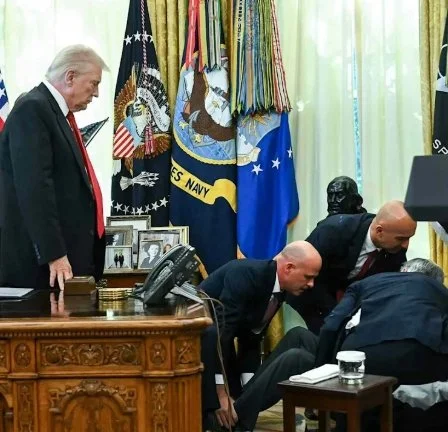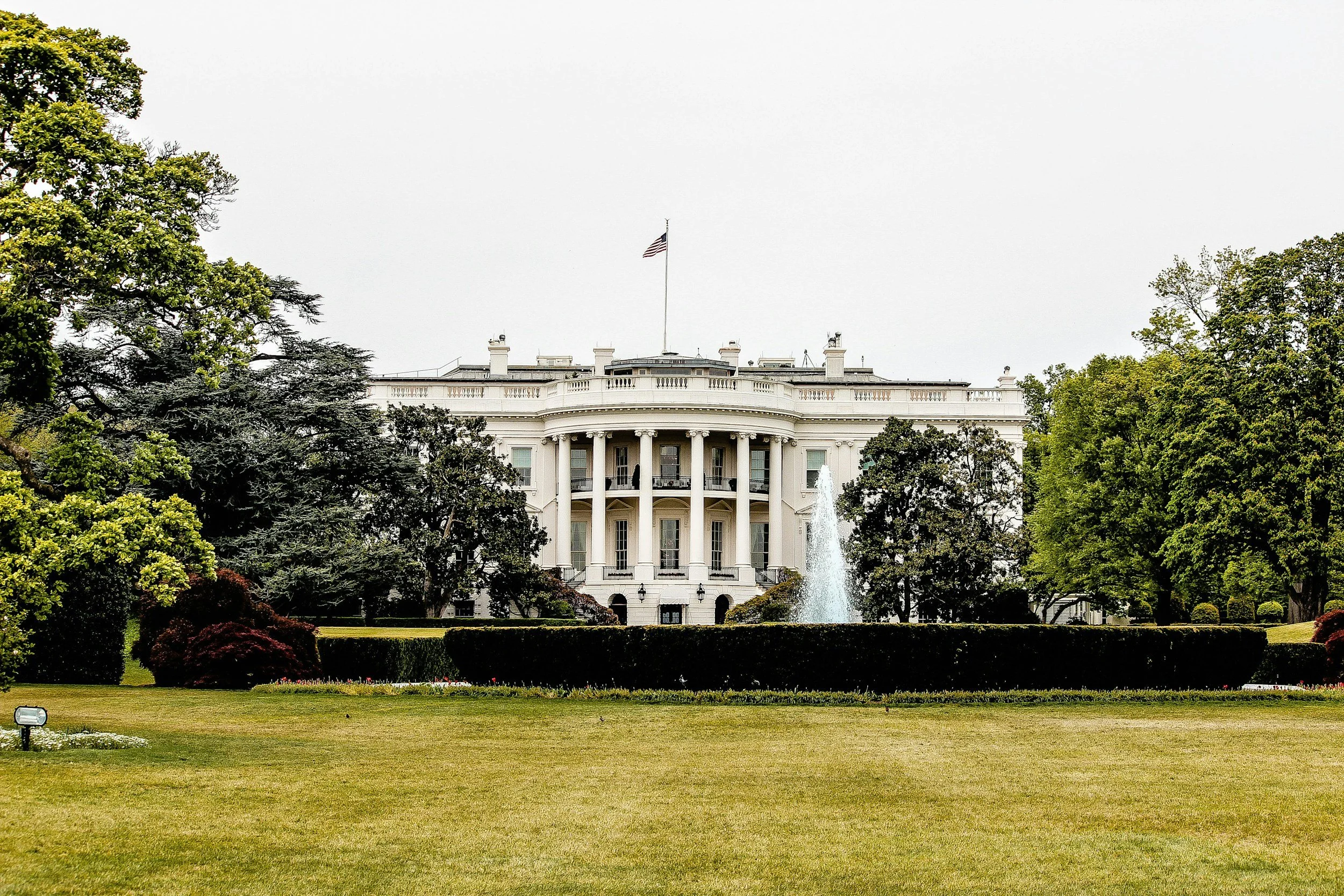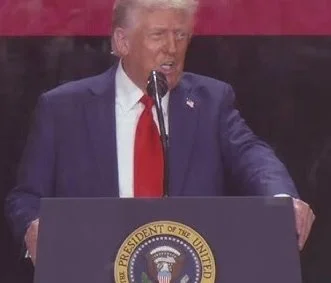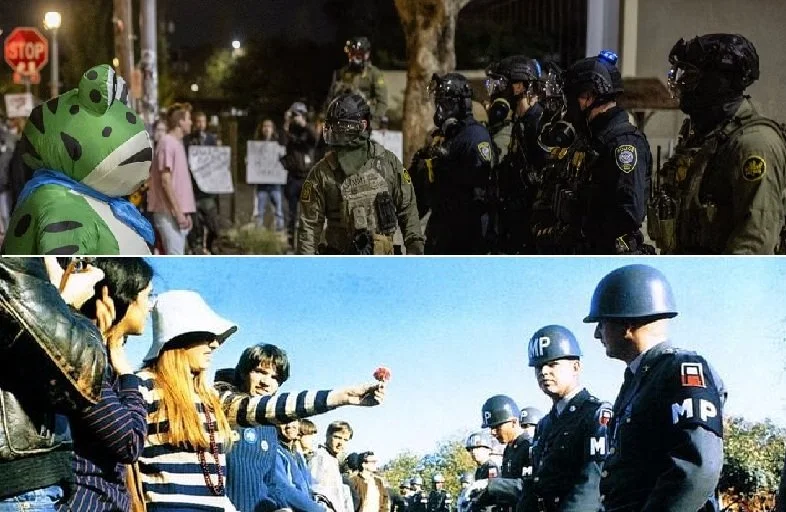Tariffs as 'By Proxy Soft Power': A Strategic Analysis of U.S. Economic Pressure on China and Its Ripple Effects on Russian Relations
"President Trump is either very smart or very stupid — and both are dangerous in today’s geopolitical world."
This observation, though blunt, captures the precarious nature of modern U.S. foreign policy. In an era defined less by cooperative shared interest and more by ‘transactional’ manoeuvring, decisions that may seem impulsive or calculated (or both) can carry seismic consequences. Among these, the use of tariffs as a form of pressure on rival powers has emerged not just as Trump’s go to economic weapon, but as an instrument of indirect influence: a kind of “by proxy soft power.”
This term encapsulates the idea that economic measures, such as punitive tariffs, can exert influence over geopolitical alignments and behaviours without direct military or diplomatic engagement. The recent cumulative 104% tariff imposed by the U.S. on goods imported from China is a stark example of this doctrine in action. While officially framed as a trade policy aimed at restoring balance, the real implications ripple far beyond economics. These tariffs are not only squeezing China’s industrial ambitions but also inadvertently deepening the strategic partnership between China and Russia. In a climate where the US has been observed softening its stance on Russia, while decreasing support for Ukraine, one has to question, is this a deliberate strategy to pressure China into deeper alignment with Russia?
This essay explores how tariffs, as a form of indirect coercion, are reshaping alliances, encouraging economic realignments, and potentially altering the trajectory of global conflicts such as the war in Ukraine. It further examines the range of potential responses from China and assesses the likelihood and impact of each, suggesting that tariff-driven policy, while subtle, is not without its unintended (or intended) consequences.
Disclaimer: This commentary reflects the personal analysis of the author. It is not intended to offer policy or diplomatic advice. All sources referenced are publicly available as of the date of publication.
Update: When Tariffs Become Tools of Market Manipulation
10/04/25: In a stunning sequence that blurs the line between economic policy and financial manipulation, since this article went out President Donald Trump issued sweeping tariffs on nearly all U.S. trading partners on April 9, 2025, triggering an immediate plunge in the stock market. Mere hours later, Trump posted on social media: “Now’s the time to buy” a cryptic but clear signal to investors. Just two hours after that, the White House abruptly paused the tariffs for 90 days on all countries except China, which saw its rate increased to 125%, and Russia, which remained untouched.
The markets roared back. Stocks surged. And Trump, now openly boasting about how much money he and “smart investors” made during the volatility, has reignited serious concerns about insider trading at the highest level of government.
This development casts a darker shadow over the earlier analysis of tariffs as “by proxy soft power.” It now appears the tariffs may not only serve as indirect geopolitical weapons, but also as deliberately engineered financial events, orchestrated for personal or political gain. The implications are chilling: not just a realignment of global alliances, but a weaponization of economic panic — all under the guise of economic nationalism.
Russia’s continued exemption from tariffs, combined with the quiet reduction of U.S. support for Ukraine, only deepens suspicions of strategic misdirection. What was once seen as questionable policy now risks being interpreted as a deliberate betrayal of democratic and economic norms, a bait-and-switch that plays the global economy like a casino, with billionaires at the table and the public left holding the losses.
This is more than poor governance. It is potentially a historic abuse of power, where foreign policy, financial markets, and even war become chess pieces in a game of personal enrichment.
Key Points Summary
Tariffs as “By Proxy Soft Power”
U.S. tariffs, including the recent 104% duty on Chinese imports, are being used not only to address trade imbalances but also as instruments of indirect geopolitical influence. These measures may aim to shape global behaviour without direct military or diplomatic confrontation.Strategic Ripple Effect
Rather than isolating China, these tariffs may be encouraging a closer strategic alignment between China and Russia. Their partnership is driven by shared economic exclusion and a mutual interest in challenging U.S. global dominance.China’s Calculated Response
In response to U.S. pressure, China is likely to deepen its support for Russia through dual-use technology exports, energy and banking ties, and diplomatic alignment. These moves are subtle but strategically significant.Tariffs May Strengthen Opponents
Attempts to constrain China could be reinforcing its position as a key enabler of Russia’s war effort. Instead of weakening adversaries, U.S. economic pressure may be increasing their interdependence and resilience.Global Realignment Beyond the West
Nations in Africa, Latin America, and Southeast Asia are observing U.S. trade tactics and may hedge their bets by strengthening ties with China and Russia. This trend points toward a more multipolar and fragmented global order.Whose Side Is Trump On?
The U.S. has imposed aggressive tariffs on China while appearing to ease pressure on Russia and scale back support for Ukraine. This raises deeper questions about the strategic direction and priorities of U.S. foreign policy.
Tariffs as Geopolitical Instruments
In classical economic terms, tariffs are imposed to protect domestic industries or to punish unfair trade practices. However, when wielded by a superpower like the United States against a strategic rival like China, tariffs take on a new dimension: they become an act of geopolitical signalling. By imposing a cumulative 104% duty on Chinese imports, Washington is not merely defending its manufacturing base, it is sending a message to Beijing about the costs of rivalry and the boundaries of acceptable global conduct. This "by proxy soft power" aims to achieve strategic goals through economic means, hoping to influence China's behaviour on the global stage.
This economic pressure also reverberates through the global system. China, increasingly facing trade restrictions from the US , finds a ready partner in Russia, whose economy is similarly estranged due to sanctions over the Ukraine war. The result is a tightening of Sino-Russian ties, not necessarily because of shared ideology, but because of shared exclusion and a common desire to counter US influence. The two nations, united by economic necessity and a mutual strategic competitor in the United States, are being nudged closer into what might be termed a 'pressure-forged partnership'. This partnership is evident in the increasing trade volume between them, with China becoming a crucial economic lifeline for Russia, especially in supplying energy and dual-use goods.
China’s Strategic Calculus Under Tariff Pressure
Faced with escalating tariffs and a hostile trade environment, China is recalibrating its global strategy. Rather than retreat, Beijing is likely to pursue a multi-pronged approach that reinforces its strategic autonomy while subtly supporting its allies, especially Russia. The likelihood and potential impact of China’s moves under this pressure can be broken down as follows:
| Potential Move from China | Likelihood | Strategic Impact |
|---|---|---|
| Increase in dual-use tech exports to Russia (e.g., microelectronics, military optics, drone components) | High | Strengthens Russia’s military capabilities while maintaining deniability |
| Expand energy and banking ties with Russia (increased purchase of Russian oil and gas) | Very High | Provides Russia with economic lifelines, deepens financial interdependence |
| Co-develop military technologies (drones, AI, electronic warfare) | Medium-High | Enhances Russian defense posture, promotes tech sovereignty for both countries |
| Public diplomatic and media support for Russia | Medium | Undermines Western narratives, builds legitimacy for Russian actions |
| Direct provision of lethal aid or military advisors | Low (for now) | Would signal full alignment, risk Western sanctions on China |
These responses demonstrate a sophisticated strategy of indirect engagement, China supporting Russia not by boots on the ground, but through a web of economic, technological, and diplomatic channels that are harder to counter and easier to deny. China's consistent refusal to condemn Russia's aggression in Ukraine and its emphasis on a peaceful resolution, while seemingly neutral, often aligns with Russian narratives.
Tariffs, Soft Power, and the (Un)Intended Strategic Realignment
The irony of using tariffs as soft power is that while they are intended to isolate and weaken adversaries, they can sometimes produce the opposite effect, not through failure, but through geopolitical realignment. In pushing China out of Western markets, the United States may be reinforcing the very alliances it publicly seeks to disrupt. As Trump imposes a 104% tariff on Chinese imports, Washington is narrowing Beijing’s economic options and, in doing so, nudging it deeper into Moscow’s embrace.
This "pressure-forged partnership," forged by mutual economic estrangement from the U.S., is creating a growing strategic alignment. China has become a critical economic lifeline for Russia, not only through energy purchases but also in the transfer of dual-use technologies that can bolster Russia’s military capabilities. Meanwhile, Russia offers China an increasingly vital partner in building an alternative trade and security ecosystem resistant to U.S. led influence. Essentially, the tools meant to suppress China's global standing may be strengthening its most strategically significant partnership.
The consequences of this go beyond trade. By intensifying its support (economic, technological, and diplomatic), China is quietly becoming more central to Russia’s survival in the war against Ukraine. If Beijing’s strategic imperative is to prevent Russia’s defeat, U.S. pressure may not deter this outcome, it may accelerate it. The very act of trying to economically constrain China could be transforming it into a stabilizing force for the Kremlin.
This geopolitical pivot isn’t occurring in isolation. Nations across Africa, Latin America, and Southeast Asia are watching how U.S. economic coercion plays out and may hedge accordingly. As the global south seeks alternatives to U.S. dominated trade routes and financing, the soft power competition extends far beyond Beijing and Moscow. The idea that Washington excluded Russia from the initial tariff list while Ukraine faces diminishing support further complicates perceptions of U.S. intent. In this light, tariffs cease to be merely economic instruments, they become geopolitical catalysts that are redrawing alliances, accelerating multipolarity, and potentially reshaping the foundations of global order.
Simply put
Tariffs, when deployed as tools of foreign policy, can function as a form of by proxy soft power; an indirect means of reshaping the global order without firing a single shot. But this power is not neutral, and it is certainly not without consequences. The cumulative 104% tariff on Chinese imports may be sold as a strategy to protect American workers or correct trade imbalances. In reality, it may be accelerating the consolidation of an alternative geopolitical bloc that is openly hostile to Western values and interests.
If this is a calculated strategy, it represents a profound and deliberate shift, one that places the United States in silent alignment with Russia while applying maximum pressure on China, all as Ukraine’s support is quietly reduced. In that context, the question is no longer whether this is a misstep, but whether it is a shadow play. A geopolitical bait-and-switch that masks collusion behind the façade of economic patriotism.
If, on the other hand, this is not strategy but oversight, then it amounts to one of the most monumental foreign policy blunders in recent memory. A failure of judgment on a scale that risks redrawing the global map in favor of authoritarian partnerships and eroding the credibility of the U.S. on the world stage.
As the United States continues to weaponize economic tools against its rivals, it must confront the full consequences of those choices. In a multipolar world, coercion without clarity pressure without principle, does not isolate adversaries, it empowers them.
In the end, it seems that tariffs are no longer about trade. They are instruments in the high-stakes game of global influence, with the power to either reinforce a rules based international order or quietly unravel it.
References
Trump's sweeping new tariffs in effect, including 104% on goods from China - CBS News, accessed on April 9, 2025, https://www.cbsnews.com/news/tariffs-trump-in-effect-104-percent-china/
Trump threatens more tariffs on China as global markets shudder ..., accessed on April 9, 2025, https://apnews.com/article/trump-tariffs-stock-market-52a00ea2bb92a067ee72343941b02cd4
Trump's Tariff Wars LIVE: China Responds To US President's 104% Tariff Imposition, accessed on April 9, 2025, https://www.youtube.com/watch?v=9SK8JBhqj9U
Three years of war in Ukraine: the Chinese-Russian alliance passes the test, accessed on April 9, 2025, https://www.osw.waw.pl/en/publikacje/osw-commentary/2025-01-20/three-years-war-ukraine-chinese-russian-alliance-passes-test
The China-Russia relationship and threats to vital US interests - Brookings Institution, accessed on April 9, 2025, https://www.brookings.edu/articles/the-china-russia-relationship-and-threats-to-vital-us-interests/
Should China have a role in ending the war in Ukraine?, accessed on April 9, 2025, https://www.brookings.edu/articles/rivals-and-responders-the-us-china-and-global-crisis-management/
Russia — Zero Tariffs Bring Zero Relief - CEPA, accessed on April 9, 2025, https://cepa.org/article/russia-zero-tariffs-bring-zero-relief/
Sanctions and the geopolitics of trade - GIS Reports, accessed on April 9, 2025, https://www.gisreportsonline.com/r/sanctions-trade-routes/
China and Russia's strategic relationship amid a shifting geopolitical landscape, accessed on April 9, 2025, https://www.brookings.edu/articles/china-and-russias-strategic-relationship-amid-a-shifting-geopolitical-landscape/
Why Was Russia Spared From Trump's Tariffs? - Belfer Center, accessed on April 9, 2025, https://www.belfercenter.org/research-analysis/why-was-russia-spared-trumps-tariffs
China's Options Against US Economy As Trump's Tariffs Bite - Newsweek, accessed on April 9, 2025, https://www.newsweek.com/china-countermeasures-us-economy-trump-tariffs-2057006
Global Trade War Does Not Diminish Pressure on Russia to End Its War - PRIO Blogs, accessed on April 9, 2025, https://blogs.prio.org/2025/04/global-trade-war-does-not-diminish-pressure-on-russia-to-end-its-war/
Experts React: How the world is responding to Trump's 'liberation day' tariffs, accessed on April 9, 2025, https://www.atlanticcouncil.org/blogs/new-atlanticist/experts-react/experts-react-how-the-world-is-responding-to-trumps-liberation-day-tariffs/
What are the implications of the US-China tariffs war? | Inside Story - YouTube, accessed on April 9, 2025, https://www.youtube.com/watch?v=SwR6BLLRXBE
Fact Sheet: President Donald J. Trump Declares National ..., accessed on April 9, 2025, https://www.whitehouse.gov/fact-sheets/2025/04/fact-sheet-president-donald-j-trump-declares-national-emergency-to-increase-our-competitive-edge-protect-our-sovereignty-and-strengthen-our-national-and-economic-security/
On the record: The U.S. administration's actions on Russia - Brookings Institution, accessed on April 9, 2025, https://www.brookings.edu/articles/on-the-record-the-u-s-administrations-actions-on-russia/
Sanctions, Tariffs, and Retaliation: Are Trade Wars the New Warfare? - Modern Diplomacy, accessed on April 9, 2025, https://moderndiplomacy.eu/2025/04/09/sanctions-tariffs-and-retaliation-are-trade-wars-the-new-warfare/
The Geopolitics of Tariffs, accessed on April 9, 2025, https://geopoliticalfutures.com/the-geopolitics-of-tariffs/
Transcript of U.S. Treasury Secretary Scott Bessent Interview with ..., accessed on April 9, 2025, https://home.treasury.gov/news/press-releases/sb0073
China's Position on Russia's Invasion of Ukraine | U.S., accessed on April 9, 2025, https://www.uscc.gov/research/chinas-position-russias-invasion-ukraine
United States Sides with Russia, Breaks with Europe, in Ukraine War Resolution | BU Today, accessed on April 9, 2025, https://www.bu.edu/articles/2025/us-sides-with-russia-ukraine-war-resolution/
Trump tariffs: China's tougher response in trade war 2.0 signals readiness to decouple from US economy - CNA, accessed on April 9, 2025, https://www.channelnewsasia.com/east-asia/china-response-us-trade-war-20-tariffs-tougher-stance-5054301
What Americans believe about ending the war in Ukraine - Brookings Institution, accessed on April 9, 2025, https://www.brookings.edu/articles/what-americans-believe-about-ending-the-war-in-ukraine/
How U.S. Tariffs on China Might Bolster Other Asian Economies, accessed on April 9, 2025, https://www.iar-gwu.org/blog/how-us-tariffs
U.S. Relations With Russia - United States Department of State, accessed on April 9, 2025, https://www.state.gov/u-s-relations-with-russia/
Ukraine and Russia: A shift in US policy - The House of Commons Library, accessed on April 9, 2025, https://commonslibrary.parliament.uk/research-briefings/cbp-10218/


